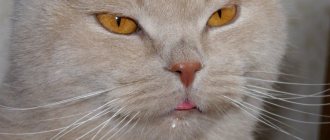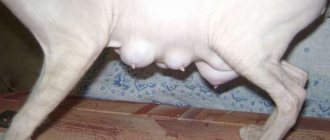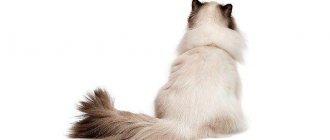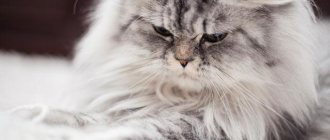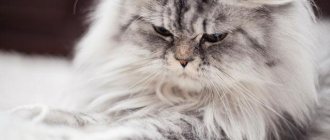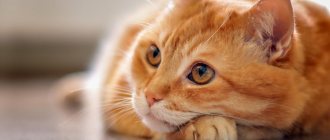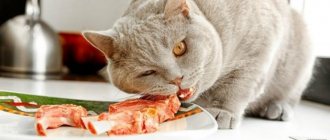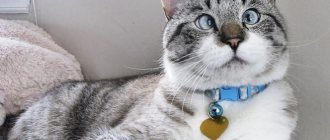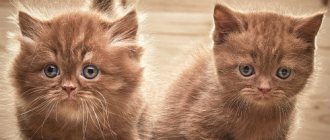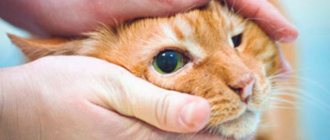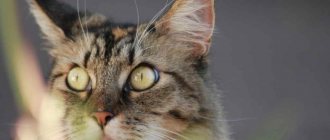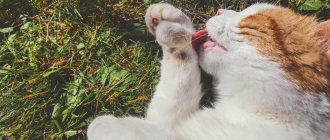Home » Useful Information
Increased salivation in cats can appear for completely harmless reasons, but in some cases the provocateur becomes a pathology that requires mandatory treatment. When such a clinical picture occurs, competent differential diagnosis is important, which will help to identify the disease in the pet at the initial stage.
- 2 Causes of hypersalivation
2.1 The main causes of hypersalivation in cats - video
- 4.1 Drugs that are used to eliminate the causes of hypersalivation - photo gallery
Signs of excessive salivation in cats
Increased salivation (hypersalivation) is not always a sign of pathology. Sometimes this is a reaction to irritation of the taste buds. In this case, the drool is similar in consistency to water and can flow down in a thin stream or drops. The animal constantly swallows and may also wash its face more often. Saliva may be released in large quantities and accumulate in the corners of the mouth, resembling foam. This symptom indicates pathology and occurs with lesions in the mouth. To remove excess saliva, the cat may constantly rub its face against the corners of the furniture.
Increased salivation in a cat is not always a symptom of a disease.
Additional signs of hypersalivation that may indicate disease:
- wet face, neck and, less frequently, front legs;
- poor health or, on the contrary, increased excitability;
- decreased appetite;
- vomiting and diarrhea;
- itching and skin rashes;
- increased body temperature;
- cough;
- constant slurping.
Attention! If your furry friend suddenly starts drooling, you need to monitor his behavior. Even if there are no additional signs, it is important to consult a doctor.
Mr. Cat recommends: preventing clear drooling
By following simple rules, you can avoid excessive drooling in your pet. Among the main ones are:
- keep all medications, toxic substances and household chemicals out of reach to prevent your pet from eating them;
- stop growing poisonous indoor flowers or put them in another room where the animal has no access;
- regularly independently examine the cat’s mouth so as not to miss the onset of the infectious process;
- Constantly monitor the animal’s diet, exclude sharp bones and excessively hard particles from it;
- flea medications should be dripped onto the fur in a place where the cat cannot lick it (for example, on the withers);
- timely vaccination against infectious diseases;
- Take your pet to the veterinarian at least once a year for a preventive examination.
It is important to remember that with any changes in the animal’s condition, it is better to consult a specialist rather than hope that it will go away on its own. Should you worry if one day you notice your pet has dripping saliva, a wet chin and wet fur on his chest? Yes
Because
Should you worry if one day you notice your pet has dripping saliva, a wet chin and wet fur on his chest? Yes. Because
Cats should not normally drool
Drooling, also known as ptyalism, also known as hypersalivation, also known as sialorrhea, is an increase in the function of the salivary glands, that is, increased formation of saliva.
First of all, this is a symptom of nausea, which, in turn, is a symptom of many things (poisoning, infectious or systemic diseases, etc.).
Best articles: Sharp-crested tit - a small bird with an original hairstyle
It can also be caused by nervous disorders, inflammation of the oral cavity, foreign body, or dental problems.
Causes of hypersalivation
Hypersalivation is not a characteristic feature of any particular breed and, under the influence of provoking factors, can occur in all cats. All causes can be roughly divided into 3 categories: physiological, psychological and pathological. Each of them has its own characteristics.
Physiological reasons:
- Changing teeth. This is most often observed in kittens. When baby teeth fall out and permanent teeth grow in their place, this may be accompanied by irritation of the gums, which provokes increased production of saliva.
- Activation of taste buds. Occurs when the cat smells his favorite food, if he is hungry and is preparing to eat. At the same time, more saliva begins to be released. This is also observed in people who imagine the taste of sour lemon.
- Defensive reaction. Some bitter medicines provoke a symptom that is a natural reaction of the body. In this case, such a sign does not require special therapy.
- Tooth loss and wear in older cats. Provokes drooling and bad breath.
Physiological hypersalivation is observed in cats before eating when smelling food
Psychological factors, such as stress and nervous tension, cannot be discounted. Activation of the autonomic nervous system, under the influence of which the production of saliva increases, can be triggered by fear, contact with other animals, moving to a new place, visiting a veterinarian, etc. In this case, the cat may experience shortness of breath and a worsening appetite. The animal often hides in a secluded corner and looks hunted. After eliminating the provoking factor, the pet’s body is restored, and hypersalivation stops.
Stress in a cat can cause active salivation
Pathological factors:
- Oral diseases. These include gingivitis, herpes, periodontitis, etc. In this case, the pet’s gums are swollen, red and bleeding.
- A foreign body, such as a bone, stuck between the teeth or in the throat of an animal. Additionally, your pet may be bothered by a cough and thirst.
- Rabies virus. At the same time, the animal’s behavior changes and photophobia occurs. The pet may become aggressive or, on the contrary, lethargic. Saliva is released in large portions, and the fur falls off.
- Poisoning that can be caused by topical flea chemicals and medications. It is a common cause of hypersalivation. In this case, vomiting, diarrhea and decreased appetite are additionally present. The temperature also often rises.
- Gastritis and ulcerative lesions of the gastrointestinal tract. They can cause a similar clinical picture and are often accompanied by a decrease in appetite and bowel dysfunction.
- Helminthic infestations present in the animal's gastrointestinal tract. In this case, the animal may lose weight.
- Malignant and benign tumors.
- Allergic reaction to food, insect bites and medications. May be accompanied by increased salivation, as well as itching and skin rashes. In this case, it is important to show the cat to a veterinarian.
Lack of activity in a cat, increased salivation and abnormal bowel movements indicate poisoning
Also, one of the serious causes of drooling may be calcivirosis, an infectious disease that can cause lameness, inflammation of the conjunctiva, nose, ulceration of the gums and damage to the respiratory system. If the pathology is not detected in time, a secondary bacterial flora may join, which will provoke pneumonia.
Calcivirosis is characterized by inflammation of the respiratory system and increased salivation
Attention! If hypersalivation is accompanied by additional symptoms, then self-medication can cause a deterioration in the pet’s condition. Active saliva production cannot be ignored. It is important to take your cat to the vet on time to reduce the risk of complications.
The main causes of hypersalivation in cats - video
Why does a cat drool from its mouth while sleeping?
During the heat, cats' bodies overheat and the pet's first defense mechanism is drooling. In this way, their body cools itself, so there is no need to help the cat, at this moment it helps itself.
Regarding the animal's mental health, cats salivate profusely during times of stress. Also, during times of nervous tension, they may wash their faces frequently, which also refers to frequent drooling.
During kidney failure in cats, saliva is released suddenly and continues for an hour and a half, which is a sure sign to take your pet to the vet.
Surgery, injections, medications are always stressful for the animal, so drooling after such manipulations is normal. Your pet is simply experiencing nervous tension, which is why saliva is released.
Why does a cat drool from his mouth when you pet him or when he purrs?
Healthy animals do not have the habit of drooling, but many drool when petted. It is possible that in this way they show their happiness from such a process.
The cat is drooling and sticking out its tongue, what could it be?
Typically, cats stick out their tongues and drool to cool their bodies. In this case, the only thing to worry about is that the cat could get sunstroke. A cold compress will help your pet feel better.
The cat is drooling while driving in the car, what to do?
Cats not used to riding in a car. They, like many people, get motion sickness, which is the reason for drooling while driving.
Drooling in a cat in the heat and sudden what is it and how to help
During the heat, cats' bodies overheat and the pet's first defense mechanism is drooling. In this way, their body cools itself, so there is no need to help the cat, at this moment it helps itself.
What makes a cat drool (excessive salivation)
Increased salivation in cats can be caused by various reasons. They can be both physiological and psychological in nature. Sometimes hypersalivation indicates the presence of a disease in a pet.
Psychological reasons
This condition is often observed in animals experiencing stress, for example, due to a large number of guests or the annoying attention of children.
Due to illness
Hypersalivation is also caused by viral infections, which disrupt the normal functioning of the gastrointestinal tract. It can also be a consequence of allergies, infection with worms, and various inflammatory processes in the organs of the digestive system.
Going to the vet
To find out the cause of drooling in a cat and prescribe treatment for your pet, you need to visit a veterinarian. A specialist may examine the oral cavity to determine the condition of the teeth and gums and determine the presence of wounds or foreign objects.
Best articles: Renewable energy sources: examples, characteristics and use
An ultrasound or x-ray may be prescribed if there is a suspicion of foreign objects in the esophagus. In addition, if necessary, blood, urine or stool tests are performed to determine the pet's specific disease.
What to do: how to help your pet
For viral infections, drugs such as Gamavit, Vitafel, Fosprenil, etc. may be prescribed. If worms are found, deworming is carried out, which usually involves taking various medications prescribed depending on the type of parasites. This could be Milbemycin, Praziquantel, Selamectin, etc.
When diagnosing cancer, surgery may be necessary, but, unfortunately, this rarely helps. Rabies is incurable.
Related news
Good evening, please help me at moevo kakarika moevo lucheva friend of his kind.
And I think that the main thing is that it is comfortable for me and cozy for my Albert. I tried several options...
Exclusive offer in St. Petersburg and the Leningrad region from Finland with international delivery in the north.
Very good article! Thanks a lot.
The information is actually very useful.
- 2018 Pets2.me
- Confidentiality
The use of any materials posted on the site is permitted provided there is a link to pets2.me
The editors of the portal may not share the opinion of the author and are not responsible for copyright materials, for the accuracy and content of advertising
https://pets2.me/bok/678-obilnoe-slyunootdelenie-u-kota-koshki-prichiny-i-lechenie.html
No comments yet!
Diagnostic methods
Diagnostic methods used to identify the provoking factor:
- Inspection. The doctor determines the condition of the gums, teeth, larynx, and skin. With allergies, rashes are often observed, and the presence of inflammatory processes can be understood by reddened and swollen tissues in the oral cavity. The veterinarian also feels the abdominal cavity. If the pet reacts violently to the procedure, then the presence of gastrointestinal diseases can be suspected.
- Ultrasound. Ultrasound examination is used to identify foreign bodies and tumors in the abdominal cavity. This method is completely safe and painless for the animal.
- Blood, urine and stool tests. An increase in leukocytes and red blood cells in plasma indicates an inflammatory process. Also, such deviations may indicate the presence of tumors. Protein can be detected in the urine, indicating a malfunction of the urinary system, an inflammatory process, as well as salts, the increase of which indicates the presence of kidney stones. Bacteria present during an infectious process may be found in urine. Stool analysis is necessary to identify helminthic infestations.
- MRI. Magnetic resonance imaging is an expensive research method, thanks to which it is possible to determine disturbances in the functioning of internal organs, as well as the presence of tumor processes. This procedure requires preliminary sedation (injection of sleeping pills) of the pet so that it does not move or run away during the examination.
Ultrasound allows you to identify pathologies of the pet’s internal organs
An integrated approach to diagnosis allows you to obtain an accurate result based on a number of studies. In this case, pathology can be detected in the early stages of development.
Injury
Trauma to the mouth can cause excessive drooling. Oral injuries can occur if a cat bites through an electrical cord and suffers a burn to the mouth. If your cat has recently gotten into a fight with another cat, any trauma to the mouth, such as a broken jaw, may cause drooling.
Keeping a cat indoors reduces the chance of injury from being hit by a car or attacked by a rival cat for territory. An injury to a dislocated temporomandibular joint or a fractured jaw can lead to excessive drooling due to the cat's inability to close its mouth.
If you suspect your cat is drooling due to an oral injury, a thorough oral examination and x-rays may be required to make an accurate medical diagnosis.
Treatment of pathologies associated with the symptom
If increased salivation is caused by physiological factors, then no special treatment is provided. Psychological and pathological causes require mandatory therapy. What treatment methods are used depending on the factor:
- If the cause is nervous overstrain, cats are usually prescribed sedative medications: Stop Stress, Fitex, etc. Such drugs help eliminate the effects of stress. The course of treatment often does not exceed 7–14 days. Stop Stress is usually given 1 tablet per day or 1 drop per 1 kg of weight, and Fitex 3-5 drops per day. The exact dose is determined by the doctor. In addition, it is important to provide the pet with peace and surround it with affection and care.
- For diseases of the oral cavity, anti-inflammatory drugs are used, such as Dentavedin gel, Zubastik spray, etc. These drugs eliminate swelling of the gums and have an antiseptic and healing effect. Gel Dentavedin contains bee products, chlorhexidine and medicinal plants. It should be applied 2-3 times a day to the gums for 5-7 days. Zubastic spray also contains plant extracts and an enzyme anti-inflammatory complex. The medicine is irrigated into the mouth several times a day for a week.
- If a cat has a bone or other foreign object stuck in its throat or teeth, it must be removed in a veterinary clinic. For these purposes, the doctor can use tweezers or an endoscope. Immediately after removing the foreign body, hypersalivation stops. It is dangerous to independently remove a bone stuck in the larynx, as you can push it further or injure your pet (especially when using tweezers).
- If the cause is the rabies virus, which was diagnosed in the laboratory, then, unfortunately, the pet is euthanized. This disease is incurable and dangerous not only for animals, but also for people. Therefore, if rabies is suspected, the cat is quarantined until a diagnosis is made.
- In case of poisoning, the pet is prescribed adsorbents such as activated carbon. The tablet must be crushed into powder and dissolved in 1 tsp. water, then forcefully pour it into your pet’s mouth. However, if the intoxication is severe, then urgent hospitalization is required, which includes gastric lavage. In addition to adsorbents, the animal should be given 20 ml of water every hour from a syringe without a needle if it does not drink on its own. This procedure will prevent dehydration.
- If the provoking factor for hypersalivation is helminthic infestations, anti-helminth medications are prescribed, such as Prazicide, Drontal, etc. In most cases, a single application is enough to rid your furry friend of parasites. The dose should be calculated based on the cat's body weight.
- The presence of tumors requires treatment only in a hospital setting. In this case, they resort to surgical intervention, which is aimed at excision of the tumor. Additionally, medications may be prescribed: Metastop, Cytostat, etc. The first drug prevents the growth of tumors and reduces the risk of metastases, and also has an antitoxic effect. Cytostat improves the overall well-being of the pet. Additionally, it has an antioxidant and antitoxic effect, accelerating recovery.
- If the provocateur of increased salivation is an allergic reaction, then drug therapy is prescribed. For anaphylactic shock, glucocorticosteroids are indicated. They are also used for severe allergic reactions, which are accompanied by severe itching. The most commonly prescribed drugs are Dexamethasone and Prednisolone, which are administered intramuscularly. A single dose ranges from 0.1 to 0.5 ml. The exact amount of solution and course are determined only by the doctor, since steroid drugs can cause dangerous side effects.
- To eliminate mild allergy symptoms, classic antihistamines are used: Suprastin, Zodak, Cetirizine, etc. They are usually given to the pet orally, a quarter of a tablet, once a day. The course is determined by the doctor. It is important to identify the allergen and eliminate it. Otherwise, after stopping therapy, the symptoms will return again.
- Calcivirosis can be eliminated with the help of complex treatment. When bacterial flora attaches, which happens in most cases, the pet is prescribed antibiotics (Tetracycline, Amoxicillin). Additionally, they resort to intravenous infusion of physiological solutions, as well as vitamin therapy. Anti-inflammatory medications such as Levomekol are used. The ointment is applied to the affected areas several times a day. To speed up recovery, immunostimulants are prescribed: Imunofan, Fosprenil, etc. The course of treatment depends on the severity of symptoms and is determined only by a doctor.
If the cause is inflammatory diseases of the gastrointestinal tract, then the cat is prescribed a gentle diet. Your pet's diet should be free of fatty, smoked and salty foods. At the same time, food is selected for sensitive digestion. It is advisable to give preference to reputable brands such as Royal Canin, Arden Grange, Pro Plan, etc. There are special lines for pets with digestive problems:
- Royal Canin Sensible 33;
- Arden Grange Sensitive;
- Pro Plan Delicate.
Royal Canin Sensible 33 is designed for pets with sensitive digestion
Attention! Without prior consultation with a doctor, you should not resort to drug therapy, especially potent drugs, which, if used incorrectly, can only cause harm.
My cat always drooled after I gave her any medicine. At first it seemed to me that the drug was toxic, which is why I had this reaction. I thought that I only made the pet worse with this treatment. It turns out that increased salivation is a normal reaction to bitters in cats. Hypersalivation is also observed when you squeeze and pet an animal excessively. According to the veterinarian, there is nothing wrong with this.
Drugs that are used to eliminate the causes of hypersalivation - photo gallery
Stop Stress has a calming effect
Activated carbon helps remove and bind toxic substances Drontal helps remove helminths
Dexamethasone eliminates acute allergic reactions Zodak relieves allergy symptoms Metastop has antitumor properties Dentavedin has an anti-inflammatory effect
Fosprenil accelerates recovery from calcivirosis
Prevention measures
Almost any disease can be prevented, and gingivitis is no exception. By following simple preventive measures, you can protect your pet from gum inflammation.
Regularly inspect your cat's mouth for wounds, scratches, ulcers, foul odor, and caries. By the way, caries, which can cause gingivitis, is successfully treated by cauterizing carious spots with sodium fluoride and silver nitrate.
When the first signs of gingivitis and other dental diseases appear, contact your veterinary clinic immediately. The sooner treatment begins, the greater the chance of avoiding health consequences.
The best prevention of gingivitis is to prevent the formation of tartar and plaque, through which the gums become infected. Clean your pet's teeth twice a month with special toothpastes.
Popular pastes include Elgidium, Radiance, and Feline Oral Care. In parallel with this, you can use special chewing toys. Such items not only strengthen and clean teeth, but also satisfy the need to chew.
If plaque has formed, you cannot do anything about it yourself. Tartar removal is carried out in a clinic; if you try to get rid of it yourself, you risk injuring your pet.
Tartar, as a rule, appears due to poor nutrition: cheap dry food of economy class, the predominance of hard foods, lack of vitamins (especially ascorbic acid). Make your cat's menu taking these features into account.
Feed your cat high-quality premium and super premium food from well-known manufacturers. Nutrients and vitamins are in optimal proportions. Twice a year, it is advisable to switch your pet to a special medicated food containing ingredients that effectively cleanse the teeth and oral cavity.
Consult your veterinarian regarding vitamin and mineral supplements. Cats require nutritional supplements fortified with vitamin C and calcium, but it is wrong to give them without consulting a specialist.
Authors of the articles: Belanta Clinic team
Preventive actions
How to prevent hypersalivation in your pet:
- monitor the condition of your gums. Brush your pet’s teeth with a special brush 2 times a week, and also examine the oral cavity for the presence of inflammatory processes;
- try to protect your cat from stress;
- do not give the animal fish with bones;
- feed your pet only high-quality food;
- keep household chemicals away, do not leave bleach, building materials, etc. open;
- avoid contact of the cat with street animals;
- Give your pet anti-worm medications once every 3 months;
- when removing fleas, make sure that the cat does not lick the preparation intended for topical use;
- do not give the animal any medications without first consulting a doctor;
- Be sure to give your cat all the necessary vaccinations;
- Take your pet to the veterinarian once every 6 months. After all, only a specialist can recognize minor deviations from the norm at the initial stages.
To prevent hypersalivation and inflammatory processes, your cat’s teeth should be brushed 2 times a week.
Attention! If the animal is often outside, then you need to bathe it once every 2 weeks. It is important to check your pet for fleas, which are carriers of helminths and various diseases.
To prevent increased salivation in the cat, as well as dangerous consequences for the gastrointestinal tract, I tried not to give my pet fish with bones. My favorite loved this product and even tried to steal the herring right from the table, but I either refused the cat such a delicacy, or first cleaned the fish from the bones. I also tried to feed my pet only high-quality products.
Prevention
It is better to prevent a problem than to waste time, effort and money on solving it. To protect your pet from potential danger, you should consider the following points:
- Store household chemicals, medicines, paints, building materials and other substances and objects that are potentially dangerous to cats out of their reach.
- If an animal is being treated with drugs that are applied to the surface of the skin or fur, care must be taken to ensure that it does not lick them off with its tongue. To do this, it is recommended to wear a special collar.
- Get all necessary vaccinations and routine checkups with your veterinarian on time.
- Do not give cats fish with small bones and exclude pointed toys.
What to do if your cat is drooling: video from a veterinarian
Care and prevention
Proper nutrition and proper care will help keep your mustachioed pet healthy. A balanced diet, comfortable keeping and hygiene are the key to strong immunity.
To prevent pathological conditions, follow the following recommendations:
- Monitor the animal closely after anesthesia. Don't leave him alone and strictly follow the instructions you receive from your veterinarian.
- Avoid long breaks between feedings. Frequent hunger is dangerous for the body.
- Eliminate bones from the diet and do not give your mustachioed pet toys that are too small.
- Follow the vaccination and deworming schedule. Remember that the rabies vaccine is the only way to avoid death if infected.
- Regularly give your pet medications or herbs to remove hair and carefully comb its fur during shedding.
- Keep all hazardous substances away from pets. When purchasing a houseplant, make sure it is not poisonous.
- Use veterinary toothpastes or special toys to clean your teeth.
- Protect your mustachioed pet from stress by avoiding possible provoking factors.
Don't forget about annual preventive examinations. Remember that for chronic diseases and age over 8 years, the frequency of visits should be increased.
Frequent and prolonged salivation is a serious cause for concern. If you suspect a pathology, check your pet for the listed symptoms and act based on the recommendations discussed.
The article is for informational purposes only. Contact your veterinarian!
Prevention of pathologies that cause hypersalivation
Measures to prevent various cat diseases and other pathological conditions include:
- regular examination of the pet's cavity;
- timely deworming;
- restricting access to poisonous plants, medicines, household chemicals and other dangerous substances that can cause poisoning;
- timely vaccination against rabies and other dangerous diseases;
- regular examinations by a specialist.
Prevention measures
To avoid excessive drooling due to pathological problems, there are some preventive measures:
- comply with mandatory vaccination requirements;
- minimize the possibility of contact between a pet and street animals;
- maintain a proper balanced diet;
- ensure the freshness of your cat’s food;
- regularly examine your pet; if unusual manifestations are detected on the skin or mucous membranes, you should seek help from a veterinarian;
- block the cat’s access to poisonous plants, medicines, and household chemicals;
- Brush the coat regularly; for fluffy breeds, use a furminator.
To prevent the formation of bezoars, there is a special paste that should be given to your pet periodically with food. It facilitates the removal of hair from the digestive tract.
All measures to prevent hypersalivation are quite simple. They do not require much effort or financial costs, but help to avoid serious health problems for your pet, and therefore prolong its life.
